- Home
- Stephen Crane
Red Badge of Courage (Puffin Classics Relaunch) Page 7
Red Badge of Courage (Puffin Classics Relaunch) Read online
Page 7
The youth cried out to him hysterically: ‘I’ll take care of yeh, Jim! I’ll take care of yeh! I swear t’ Gawd I will!’
‘Sure – will yeh, Henry?’ the tall soldier beseeched.
‘Yes – yes – I tell yeh – I’ll take care of yeh, Jim!’ protested the youth. He could not speak accurately because of the gulpings in his throat.
But the tall soldier continued to be in a lowly way. He now hung babelike to the youth’s arm. His eyes rolled in the wildness of his terror. ‘I was allus a good friend t’ yeh, wa’n’t I, Henry? I’ve allus been a pretty good feller, ain’t I? An’ it ain’t much t’ ask, is it? Jest t’ pull me along outer th’ road? I’d do it fer you, wouldn’t I, Henry?’
He paused in piteous anxiety to await his friend’s reply.
The youth had reached an anguish where the sobs scorched him. He strove to express his loyalty, but he could only make fantastic gestures.
However, the tall soldier seemed suddenly to forget all those fears. He became again the grim, stalking specter of a soldier. He went stonily forward. The youth wished his friend to lean upon him, but the other always shook his head and strangely protested. ‘No – no – no – leave me be – leave me be –’
His look was fixed again upon the unknown. He moved with mysterious purpose, and all of the youth’s offers he brushed aside. ‘No – no – leave me be – leave me be –’
The youth had to follow.
Presently the latter heard a voice talking softly near his shoulders. Turning he saw that it belonged to the tattered soldier. ‘Ye’d better take ’im outa th’ road, pardner. There’s a batt’ry comin’ helitywhoop down th’ road an’ he’ll git runned over. He’s a goner anyhow in about five minutes – yeh kin see that. Ye’d better take ’im outa th’ road. Where th’ blazes does he git his stren’th from?’
‘Lord knows!’ cried the youth. He was shaking his hands helplessly.
He ran forward presently and grasped the tall soldier by the arm. ‘Jim! Jim!’ he coaxed, ‘come with me.’
The tall soldier weakly tried to wrench himself free. ‘Huh,’ he said vacantly. He stared at the youth for a moment. At last he spoke as if dimly comprehending. ‘Oh! Inteh th’ fields? Oh!’
He started blindly through the grass.
The youth turned once to look at the lashing riders and jouncing guns of the battery. He was startled from this view by a shrill outcry from the tattered man.
‘Gawd! He’s runnin’!’
Turning his head swiftly, the youth saw his friend running in a staggering and stumbling way toward a little clump of bushes. His heart seemed to wrench itself almost free from his body at this sight. He made a noise of pain. He and the tattered man began a pursuit. There was a singular race.
When he overtook the tall soldier he began to plead with all the words he could find. ‘Jim – Jim – what are you doing – what makes you do this way – you’ll hurt yerself.’
The same purpose was in the tall soldier’s face. He protested in a dulled way, keeping his eyes fastened on the mystic place of his intentions. ‘No – no – don’t tech me – leave me be – leave me be –’
The youth, aghast and filled with wonder at the tall soldier, began quaveringly to question him. ‘Where yeh goin’, Jim? What you thinking about? Where you going? Tell me, won’t you, Jim?’
The tall soldier faced about as upon relentless pursuers. In his eyes there was a great appeal. ‘Leave me be, can’t yeh? Leave me be fer a minnit.’
The youth recoiled. ‘Why, Jim,’ he said, in a dazed way, ‘what’s the matter with you?’
The tall soldier turned and, lurching dangerously, went on. The youth and the tattered soldier followed, sneaking as if whipped, feeling unable to face the stricken man if he should again confront them. They began to have thoughts of a solemn ceremony. There was something ritelike in these movements of the doomed soldier. And there was a resemblance in him to a devotee of a mad religion, blood-sucking, muscle-wrenching, bone-crushing. They were awed and afraid. They hung back lest he have at command a dreadful weapon.
At last, they saw him stop and stand motionless. Hastening up, they perceived that his face wore an expression telling that he had at last found the place for which he had struggled. His spare figure was erect; his bloody hands were quietly at his side. He was waiting with patience for something that he had come to meet. He was at the rendezvous. They paused and stood, expectant.
There was a silence.
Finally, the chest of the doomed soldier began to heave with a strained motion. It increased in violence until it was as if an animal was within and was kicking and tumbling furiously to be free.
This spectacle of gradual strangulation made the youth writhe, and once as his friend rolled his eyes, he saw something in them that made him sink wailing to the ground. He raised his voice in a last supreme call.
‘Jim – Jim – Jim –’
The tall soldier opened his lips and spoke. He made a gesture. ‘Leave me be – don’t tech me – leave me be –’
There was another silence while he waited.
Suddenly, his form stiffened and straightened. Then it was shaken by a prolonged ague. He stared into space. To the two watchers there was a curious and profound dignity in the firm lines of his awful face.
He was invaded by a creeping strangeness that slowly enveloped him. For a moment the tremor of his legs caused him to dance a sort of hideous hornpipe. His arms bent wildly about his head in expression of implike enthusiasm.
His tall figure stretched itself to its full height. There was a slight rending sound. Then it began to swing forward, slow and straight, in the manner of a falling tree. A swift muscular contortion made the left shoulder strike the ground first.
The body seemed to bounce a little way from the earth. ‘God!’ said the tattered soldier.
The youth had watched, spellbound, this ceremony at the place of meeting. His face had been twisted into an expression of every agony he had imagined for his friend.
He now sprang to his feet and, going closer, gazed upon the pastelike face. The mouth was open and the teeth showed in a laugh.
As the flap of the blue jacket fell away from the body, he could see that the side looked as if it had been chewed by wolves.
The youth turned, with sudden, livid rage, toward the battlefield. He shook his fist. He seemed about to deliver a philippic.
‘Hell –’
The red sun was pasted in the sky like a wafer.
10
The tattered man stood musing.
‘Well, he was reg’lar jim-dandy fer nerve, wa’n’t he,’ said he finally in a little awestruck voice. ‘A reg’lar jim-dandy.’ He thoughtfully poked one of the docile hands with his foot. ‘I wonner where he got ’is stren’th from? I never seen a man do like that before. It was a funny thing. Well, he was a reg’lar jim-dandy.’
The youth desired to screech out his grief. He was stabbed, but his tongue lay dead in the tomb of his mouth. He threw himself again upon the ground and began to brood.
The tattered man stood musing.
‘Look-a-here, pardner,’ he said, after a time. He regarded the corpse as he spoke. ‘He’s up an’ gone, ain’t ’e, an’ we might as well begin t’ look out for ol’ number one. This here thing is all over. He’s up an’ gone, ain’t ’e? An’ he’s all right here. Nobody won’t bother ’im. An’ I must say I ain’t enjoying any great health m’self these days.’
The youth, awakened by the tattered soldier’s tone, looked quickly up. He saw that he was swinging uncertainly on his legs and that his face had turned to a shade of blue.
‘Good Lord!’ he cried, ‘you ain’t goin’ t’ – not you, too.’
The tattered man waved his hand. ‘Nary die,’ he said. ‘All I want is some pea soup an’ a good bed. Some pea soup,’ he repeated dreamfully.
The youth arose from the ground. ‘I wonder where he came from. I left him over there.’ He pointed. ‘And now I find ’im her
e. And he was coming from over there, too.’ He indicated a new direction. They both turned toward the body as if to ask of it a question.
‘Well,’ at length spoke the tattered man, ‘there ain’t no use in our stayin’ here an’ tryin’ t’ ask him anything.’
The youth nodded an assent wearily. They both turned to gaze for a moment at the corpse.
The youth murmured something.
‘Well, he was a jim-dandy, wa’n’t ’e?’ said the tattered man as if in response.
They turned their backs upon it and started away. For a time they stole softly, treading with their toes. It remained laughing there in the grass.
‘I’m commencin’ t’ feel pretty bad,’ said the tattered man, suddenly breaking one of his little silences. ‘I’m commencin’ t’ feel pretty damn’ bad.’
The youth groaned. ‘O Lord!’ He wondered if he was to be the tortured witness of another grim encounter.
But his companion waved his hand reassuringly. ‘Oh, I’m not goin’ t’ die yit! There too much dependin’ on me fer me t’ die yit. No, sir! Nary die! I can’t! Ye’d oughta see th’ swad a’ chil’ren I’ve got, an’ all like that.’
The youth glancing at his companion could see by the shadow of a smile that he was making some kind of fun.
As they plodded on the tattered soldier continued to talk. ‘Besides, if I died, I wouldn’t die th’ way that feller did. That was th’ funniest thing. I’d jest flop down, I would. I never seen a feller die th’ way that feller did.
‘Yeh know Tom Jamison, he lives next door t’ me up home. He’s a nice feller, he is, an’ we was allus good friends. Smart, too. Smart as a steel trap. Well, when we was a-fightin’ this afternoon, all-of-a-sudden he begin t’ rip up an’ cuss an’ beller at me. “Yer shot, yeh blamed infernal!” – he swear horrible – he ses t’ me. I put up m’ hand t’ m’ head an’ when I looked at m’ fingers, I seen, sure ’nough, I was shot. I give a holler an’ begin t’ run, but b’fore I could git away another one hit me in th’ arm an’ whirl’ me clean ’round. I got skeared when they was all a-shootin’ b’hind me an’ I run t’ beat all, but I cotch it pretty bad. I’ve an idee I’d a’ been fightin’ yit, if t’wasn’t fer Tom Jamison.’
Then he made a calm announcement: ‘There’s two of ’em – little ones – but they’re beginnin’ t’ have fun with me now. I don’t b’lieve I kin walk much furder.’
They went slowly on in silence. ‘Yeh look pretty peeked yerself,’ said the tattered man at last. ‘I bet yeh’ve got a worser one than yeh think. Ye’d better take keer of yer hurt. It don’t do t’ let sech things go. It might be inside mostly, an’ them plays thunder. Where is it located?’ But he continued his harangue without waiting for a reply. ‘I see a feller git hit plum in th’ head when my reg’ment was a-standin’ at ease onct. An’ everybody yelled out to ’im: Hurt, John? Are yeh hurt much? “No,” ses he. He looked kinder surprised, an’ he went on tellin’ ’em how he felt. He sed he didn’t feel nothin’. But, by dad, th’ first thing that feller knowed he was dead. Yes, he was dead – stone dead. So, yeh wanta watch out. Yeh might have some queer kind ’a hurt yerself. Yeh can’t never tell. Where is your’n located?’
The youth had been wriggling since the introduction of this topic. He now gave a cry of exasperation and made a furious motion with his hand. ‘Oh, don’t bother me!’ he said. He was enraged against the tattered man, and could have strangled him. His companions seemed ever to play intolerable parts. They were ever upraising the ghost of shame on the stick of their curiosity. He turned toward the tattered man as one at bay. ‘Now, don’t bother me,’ he repeated with desperate menace.
‘Well, Lord knows I don’t wanta bother anybody,’ said the other. There was a little accent of despair in his voice as he replied, ‘Lord knows I’ve gota ’nough m’ own t’ tend to.’
The youth, who had been holding a bitter debate with himself and casting glances of hatred and contempt at the tattered man, here spoke in a hard voice. ‘Good-by,’ he said.
The tattered man looked at him in gaping amazement. ‘Why – why, pardner, where yeh goin’?’ he asked unsteadily. The youth, looking at him, could see that he, too, like that other one, was beginning to act dumb and animal-like. His thoughts seemed to be floundering about in his head. ‘Now – now – look – a – here, you Tom Jamison – now – I won’t have this – this here won’t do. Where – where yeh goin’?’
The youth pointed vaguely. ‘Over there,’ he replied.
‘Well, now look – a – here – now,’ said the tattered man, rambling on in idiot fashion. His head was hanging forward and his words were slurred. ‘This thing won’t do, now, Tom Jamison. It won’t do. I know yeh, yeh pig-headed devil. Yeh wanta go trompin’ off with a bad hurt. It ain’t right – now – Tom Jamison – it ain’t. Yeh wanta leave me take keer of yeh, Tom Jamison. It ain’t – right – it ain’t – fer yeh t’ go – trompin’ off – with a bad hurt – it ain’t – ain’t – ain’t right – it ain’t.’
In reply the youth climbed a fence and started away. He could hear the tattered man bleating plaintively.
Once he faced about angrily. ‘What?’
‘Look – a – here, now, Tom Jamison – now – it ain’t –’
The youth went on. Turning at a distance he saw the tattered man wandering about helplessly in the field.
He now thought that he wished he was dead. He believed that he envied those men whose bodies lay strewn over the grass of the fields and on the fallen leaves of the forest.
The simple questions of the tattered man had been knife thrusts to him. They asserted a society that probes pitilessly at secrets until all is apparent. His late companion’s chance persistency made him feel that he could not keep his crime concealed in his bosom. It was sure to be brought plain by one of those arrows which cloud the air and are constantly pricking, discovering, proclaiming those things which are willed to be forever hidden. He admitted that he could not defend himself against this agency. It was not within the power of vigilance.
11
He became aware that the furnace roar of the battle was growing louder. Great brown clouds had floated to the still heights of air before him. The noise, too, was approaching. The woods filtered men and the fields became dotted.
As he rounded a hillock, he perceived that the roadway was now a crying mass of wagons, teams, and men. From the heaving tangle issued exhortations, commands, imprecations. Fear was sweeping it all along. The cracking whips bit and horses plunged and tugged. The white-topped wagons strained and stumbled in their exertions like fat sheep.
The youth felt comforted in a measure by this sight. They were all retreating. Perhaps, then, he was not so bad after all. He seated himself and watched the terror-stricken wagons. They fled like soft, ungainly animals. All the roarers and lashers served to help him to magnify the dangers and horrors of the engagement that he might try to prove to himself that the thing with which men could charge him was in truth a symmetrical act. There was an amount of pleasure to him in watching the wild march of this vindication.
Presently the calm head of a forward-going column of infantry appeared in the road. It came swiftly on. Avoiding the obstructions gave it the sinuous movement of a serpent. The men at the head butted mules with their musket stocks. They prodded teamsters indifferent to all howls. The men forced their way through parts of the dense mass by strength. The blunt head of the column pushed. The raving teamsters swore many strange oaths.
The commands to make way had the ring of a great importance in them. The men were going forward to the heart of the din. They were to confront the eager rush of the enemy. They felt the pride of their onward movement when the remainder of the army seemed trying to dribble down this road. They tumbled teams about with a fine feeling that it was no matter so long as their column got to the front in time. This importance made their faces grave and stern. And the backs of the officers were very rigid.
As the youth looked at them
the black weight of his woe returned to him. He felt that he was regarding a procession of chosen beings. The separation was as great to him as if they had marched with weapons of flame and banners of sunlight. He could never be like them. He could have wept in his longings.
He searched about in his mind for an adequate malediction for the indefinite cause, the thing upon which men turn the words of final blame. It – whatever it was – was responsible for him, he said. There lay the fault.
The haste of the column to reach the battle seemed to the forlorn young man to be something much finer than stout fighting. Heroes, he thought, could find excuses in that long seething lane. They could retire with perfect self-respect and make excuses to the stars.
He wondered what those men had eaten that they could be in such haste to force their way to grim chances of death. As he watched his envy grew until he thought that he wished to change lives with one of them. He would have liked to have used a tremendous force, he said, throw off himself and become a better. Swift pictures of himself, apart, yet in himself, came to him – a blue desperate figure leading lurid charges with one knee forward and a broken blade high – a blue, determined figure standing before a crimson and steel assault, getting calmly killed on a high place before the eyes of all. He thought of the magnificent pathos of his dead body.
These thoughts uplifted him. He felt the quiver of war desire. In his ears, he heard the ring of victory. He knew the frenzy of a rapid successful charge. The music of the trampling feet, the sharp voices, the clanking arms of the column near him made him soar on the red wings of war. For a few moments he was sublime.
He thought that he was about to start for the front. Indeed, he saw a picture of himself, dust-stained, haggard, panting, flying to the front at the proper moment to seize and throttle the dark, leering witch of calamity.
Then the difficulties of the thing began to drag at him. He hesitated, balancing awkwardly on one foot.

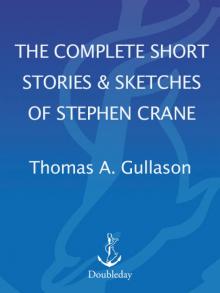 The Complete Short Stories and Sketches of Stephen Crane
The Complete Short Stories and Sketches of Stephen Crane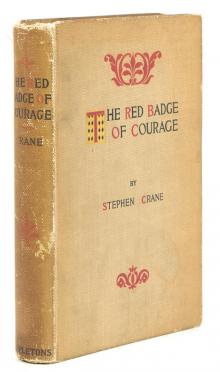 The Red Badge of Courage: An Episode of the American Civil War
The Red Badge of Courage: An Episode of the American Civil War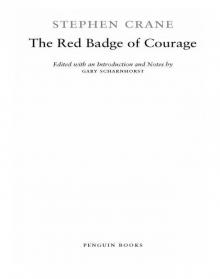 The Red Badge of Courage
The Red Badge of Courage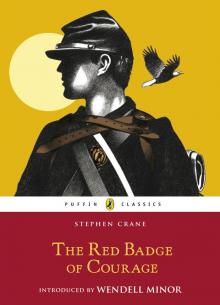 The Red Badge of Courage by Stephen Crane
The Red Badge of Courage by Stephen Crane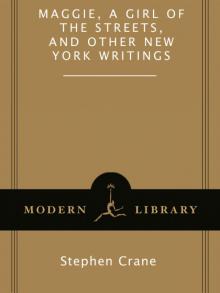 Maggie, a Girl of the Streets and Other New York Writings
Maggie, a Girl of the Streets and Other New York Writings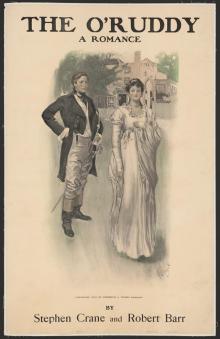 The O'Ruddy: A Romance
The O'Ruddy: A Romance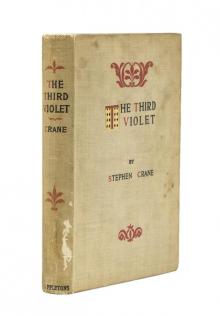 The Third Violet
The Third Violet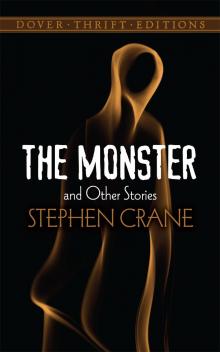 The Monster and Other Stories
The Monster and Other Stories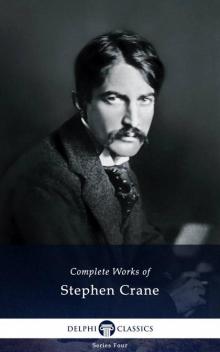 Complete Works of Stephen Crane
Complete Works of Stephen Crane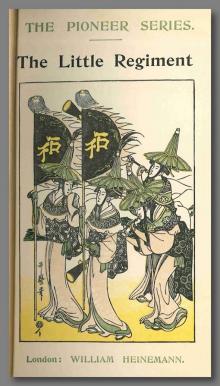 The Little Regiment, and Other Episodes of the American Civil War
The Little Regiment, and Other Episodes of the American Civil War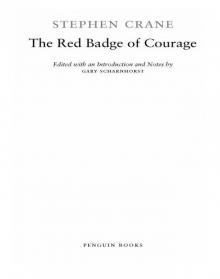 The Red Badge of Courage and Other Stories
The Red Badge of Courage and Other Stories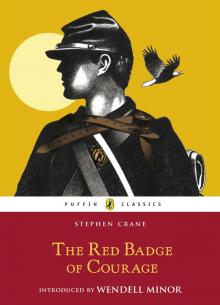 Red Badge of Courage (Puffin Classics Relaunch)
Red Badge of Courage (Puffin Classics Relaunch) The Fight: Whilomville Stories: XI.
The Fight: Whilomville Stories: XI. A Man and Some Others.
A Man and Some Others. The Monster
The Monster